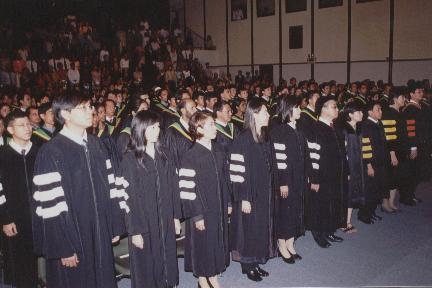
Above and below: the graduates of AIT Batch 101
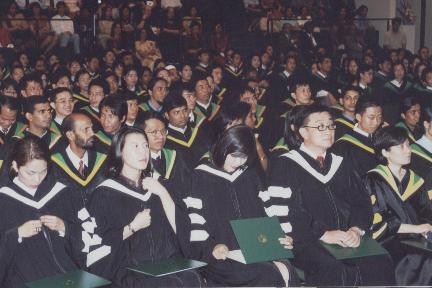
AIT holds 101st Graduation
AIT held the 101st Graduation Ceremony on 6 August 2004, marking the 101st commencement to 265 students from 21 countries at the AIT Conference Center Auditorium. Prof. Jean-Louis Armand, AIT President presided over the ceremony.
Among the 265 graduates, 14 are from the School of Advanced Technologies, 158 from the School of Environment, Resources and Development, 7 from the School of Civil Engineering, and 86 from the School of Management.
There were 20 doctoral graduates, 243 master's graduates and one diploma.
The total number of AIT alumni now stands at 13,163, with the largest number of 3,449 coming from Thailand.
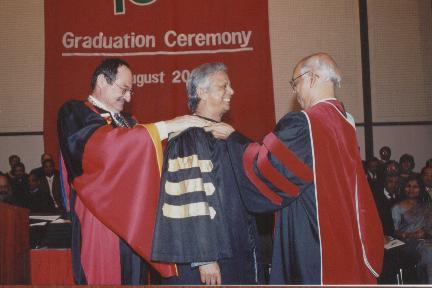
Prof. Jean-Louis Armand (left), AIT President and Prof. A.T.M. Nurul Amin (right), Honorary Doctorate Marshal confers the doctorate hood on Prof. M. Yunus
To mark the 101st Graduation Day, Prof. Muhammad Yunus, founder
of Grameen Bank and originator of the concept of micro-credit in Bangladesh,
was conferred the Doctor of Technology (Honoris Causa), the Institute's highest recognition. The Institute's conferment of honorary degree to Prof. Yunus recognizes his outstanding contributions to economic and social development of rural areas in the region, through innovative concepts that couple capitalism with social responsibility.
Prof. Muhammad Yunus is that rare thing: a bona fide visionary. His dream is the total eradication of poverty from the world.
The village, or grameen in Bengali, takes center stage in Professor Yunus'work. It was in a village near his home in Chittagong, that he first entered the world of microfinance. Strongly determined to help the poor work out their way out of poverty and with complete trust in the power of women to effect results. Professor Yunus lent 42 women the equivalent of US$27 to finance small business ventures. As expected, the loans were put to good use and were duly paid back. This modest transaction was to sow the seeds for Grameen Bank's dictum: Grameen loans are a path to self-reliance and self respect. In a word, empowerment.
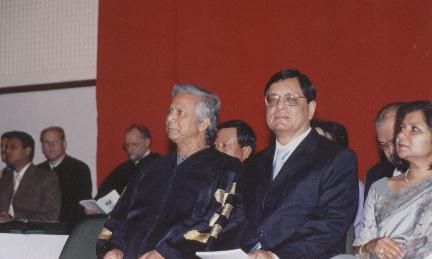
'Grameen', he claims, 'is a message of hope, a programme for putting homelessness and destitution in a museum so that one day our children will visit it and ask how we could have allowed such a terrible thing to go on for so long.' This work is a fundamental rethink of the economic relationship between the rich and the poor, their rights and their obligations.
Microfinance has taken off worldwide, and as a banking model, the Grameen Bank has been adopted in more than 100 nations. The World Bank recently acknowledged that 'this business approach to the alleviation of poverty has allowed millions of individuals to work their way out of poverty with dignity.'
Credit is the last hope of those faced with absolute poverty. Prof. Yunus believes that the right to credit should be recognized as a fundamental human right. In his book, Banker to the Poor, co-authored with American author and journalist Alan Jolis, Yunus recounts with humility and conviction the story of this struggle, and the unique and extraordinary methods he invented to combat human despair. The book is a critique of the failures and potential for good of industrial countries by a man familiar with both Eastern and Western ways of life, and an appeal for action: we must concentrate on promoting the will to survive and the courage to build in the first and most essential element of the economic cycle - man.
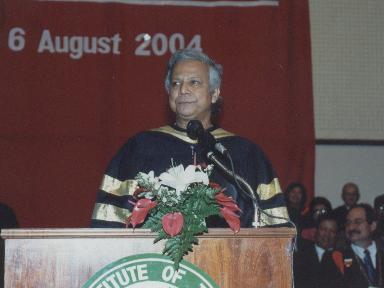
Commemmorative Speech of
Prof. Muhammad Yunus
Managing Director and
Founder of Grameen Bank and
Recipient of Doctor of Technology
(Honoris Causa)
Mr. President, Excellencies, Members of Faculty and the lucky students who will be graduating today, Good morning.
I am so happy. I want to smile but everybody looks so grim. I hope you are happy too. It's a great day. It's the day to celebrate. It's a very memorable day in anybody's life. And it's a great honor for me to come here to receive this honorary degree.
I'm very grateful to you Mr. President and to the Board of AIT and the faculty for giving me this particular honor and at this particular time. The time for me is very important because I'm coming from Bangladesh, the country which is now under a terrible flood. Half the country was under flood water until five, six days back.
Now the flood water is receding, but millions of people... by one estimate 35 million people are badly affected by the flood. It's a nice, easy description to say that 35 million people are badly affected. But the misery of the people is just limitless. So, when you go around, you get very depressed.
So, I need this cheering and I really feel cheerful because you inspire us. You inspire me and my colleagues in Grameen Bank. Twelve thousand young men and women like you who work very hard for the mission. The mission is help the poor people get out of poverty.
And 3.6 million families are poor people who are with Grameen Bank. Out of 3.6 billion, by our estimate, almost one and a half million families of Grameen Bank are under the spell of the flood and nearly half of them homeless. But they will fight the flood much better than many others in Bangladesh because they have the Bank behind them. And Grameen Bank which is with them is actually owned by them which makes all the more difference.
Today, Grameen Bank is the large bank, pretty big bank, lending out about half a billion dollar a year in tiny loans. But more than that, the money that we lend out comes from the depositors, mostly the borrowers. It's not money coming from outside, from donors or from the government or anybody. It's their own money. And I remember that Grameen Bank started facing this flood. It reminds me much more acutely because a similar disaster some 30 years back in 1974, famine in Bangladesh, while I was teaching in Chittagong University in Bangladesh.
But famine is much worse than flood because people die of hunger, not having tiny little food to eat. Everyday, you step and you inched towards step. That's what created all the tension which made me challenged one small part, at that time, I thought it's a small part, then, I found out it's a huge big part of a banking system. Bank could not lend money to the poor people. The only justification that they could give me was that poor are not credit worthy. That was not good enough for me. I challenged why they are not good credit worthy; tell me. They couldn't convince me.
So, I took the initiative to defy their role and say I will lend money to the poor people. And I did. A total of US$27 to 42 people. That's what I did. And I was shocked. I was shocked because here in the classroom we talk about million of dollars and billions of dollars and development plans we should do in our classroom. That's what I did. But I was shocked to see people needed tiny little money, not million of dollars, billion of dollars. And it worked.
So, from then on what we did with what we now called Grameen Bank is actually define the entire banking system and turned it around almost upside down. Banks said you can not lend money to the poor people. We concentrated in lending money to the poor people.
Bank's principle was 'the more you have, the more you get.' We reversed that principle, we said 'the less you have, the higher priority you get'. If you don't have anything at all, you'll get the highest priority. Banking system says you must have some experience in order to borrow money from the bank. We reversed it. We said we don't need any experience whatsoever. How can you have experience if you never began to do business in your life.
So, we said we give priority to anybody who has never done anything with any money at all. So, that's what we did. Bank's conventional banks concentrated on men. We reversed it.
We concentrated on women. 96% of our borrowers are women who started out life, never touching money in their life. Now, these are the women who now own the bank, which lend half a billion dollars a year. They are the owners. And that money comes from them because we said 'Banks said poor people cannot save. We said they are the excellent savers and today they are excellent savers. More than 200 million dollars of their saving is in the bank.
So, when the flood comes, we know they have money. They can survive. They can fight it out because they have their own money, forget about the bank's loan. Because bank has to give them back all these money whenever they want to. These are all illiterate families. So, we concentrated on sending the children to school. And today nearly 100% of the children of the Grameen families are in schools. So, these are the 3.6 million families, where the children are in school.
And then we realized later on that not only they went to school, they are moving up in the schools. They cross the primary school to go to the high school. They graduated from the high school, went to the colleges. We didn't realize this is happening until at very late, at the middle of 90s, when we found out many of the Grameen children are in medical schools, in engineering schools, in universities. Now, I hope they will be in AIT soon. They would.
We introduced the scholarship's program from Grameen Bank, so they are encouraged. Grameen Bank gives more than 6,000 scholarships every year to the students of Grameen families. Grameen Bank introduced education loans so that no son or daughter of any poor family is deprived of higher education because of money. You know how difficult it is to find money. So, the entire financing is done by Grameen Bank. Today, there are many many students, almost in all universities of Bangladesh where the Grameen children are studying in those institutions funded by Grameen Bank and the repayment of their loans of their mother's stake is nearly 100%.
So we come back to raise the issue whether conventional bank is right in saying that the poor not credit worthy? They are absolutely wrong. But the conventional banks still goes around refusing the poor people to lend money. So this is what we question. And that's why we say 'it's not the fault of the poor people why they are poor.'
Poverty is not caused by the poor people. Poverty is caused by the system. But the institutions like conventional banks that I am talking to you about, because of their refusal, because of their closure of their doors to the poor people. If you could open that, people will find their own lives. People are extremely creative. Any human being is a bundle of creativity, whether he or she is in poverty or in extreme richness doesn't matter.
Human being is a human being. Enormous ingenuity packed packed into them. All we need is to open that up. What should the student, the young man or the young woman would do to face this issue. And I come back with my experience, defy the rules. Don't be just the imitators of that happened already. That doesn't take us very far. Just get out, be yourself. Question everything and think of the world that you would like to have and you have to create it. If you just sit around, the world will not be there. The kind of world that I, you and everybody else we would like to live it.
I would like to live in the world where there is not a single human being suffers to the misery of poverty, not a single person. And it can be done. It's not in the utopia. Think about the millennium development goals set by the United Nations in their Millennium Summit of 2000.
Millennium development goals say that we shall reduce the poverty by half, by the year 2015. 2015 is not too far away, just around the corner. Are we doing anything about it? If we just proclaim that we'll reduce the poverty by half, it won't get half. It won't get done unless we prepare ourselves to do that.
If we are reducing the number of poor people by half by 2015, each day there will be thousands of people who should be coming out of poverty so that we reach the goals by 2015. So, what should we need, what do we do? Are we working it out in our classrooms? Are we playing our role as an individual? Or we are waiting for our Prime Ministers or our Presidents to do all those stuff. No, we have to do it ourselves. Then, we get it done.
So, we have a role to play, question things, set things right. Technology is one. This is what AIT is all about. So important in poor people's life. And we recognized it, not only micro credit, not only financing of the poor is important. It is important. But if you match technology with finance, it becomes extremely powerful. So, what we did we brought information technology to the poor people.
We created a company called Grameen Phone, a mobile telephone company in Bangladesh. And we brought mobile phone in the villages of Bangladesh where telephone never existed. And we brought the telephone in the villages of Bangladesh, we found out, realized again Bangladesh villages don't have electricity. Seventy percent of the people of Bangladesh have no existing electricity.
So, how do you bring mobile phones in the villages of Bangladesh where there is no electricity because you need to charge your battery. So, we created another company called Grameen Shokti or Grameen Energy to bring solar energy into the villages of Bangladesh. Now you see lots of mobile phones in Bangladesh everywhere. Many of them are charged by the solar panels.
When I am talking about half the country of Bangladesh are under flood, communications have all disrupted. Railway communications disrupted. The airlines are disrupted. Road communications disrupted. People hardly can communicate with each other but there's a mobile phone. And we gave the mobile phone to the Grameen borrowers to become the telephone lady of the village and sell the telephone service to the people in the village. And she became an instant success.
Today there are 75,000 telephone ladies all over Bangladesh, selling telephone service. When all the businesses went down during the flood, one business flourished. You guess what it is mobile telephones. Telephone ladies doing soaring business.
The whole country is now connected with each other because of the mobile phone in the hands of these poor women. Everybody said these women never saw telephone, how dare you give mobile phones in their hands. I said there is always a beginning. They said they are illiterate people. They don't know how to push those numbers. They don't know the number. I said they will learn. I said luckily there are ten numbers in the whole world. You cannot invent the eleventh one. If you do, you'll get the Nobel Prize. I said if pushing these numbers, bring money. These women will learn these numbers in ten minutes and they did. Today, they are very successful businesswomen.
So, you have to address these issues in a way it was never been done, because the world which created poverty with the rules and the institutions, they have built. With those in institutions and rules you cannot end poverty. You have to find other rules, other institutions. There's a challenge to you and if you work together, we will create that world that we all would like to have - a poverty free world. There's a challenge for you! Thank you very much.
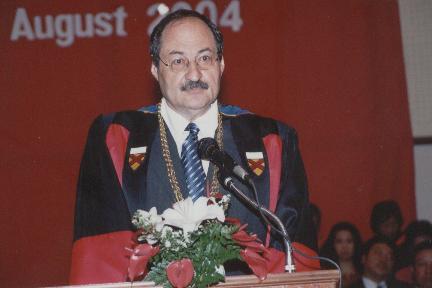
Graduation Address of
Professor Jean-Louis Armand
AIT President
on AIT's 101st Graduation Ceremony
Professor Muhammad Yunus, Managing Director and Founder of the Grameen Bank, honorary doctorate degree awardee and distinguished graduation speaker
Your Excellencies and Honoured Guests,
Faculty and Staff, Graduands,
Ladies and Gentlemen,
Welcome to the 101st Graduation Ceremony of the Asian Institute of Technology. To our 265 graduands from 21 countries, our special congratulations!
Today is the culmination of years of hard work, personal sacrifice and commitment. I encourage you to treasure this precious moment. This day is also very special for your parents, spouses, children, families, teachers and friends, who have provided the support and sacrifice without which you would not have reached this significant milestone on the road to knowledge and high accomplishments.
The graduation ceremony is one of the most important occasions in the life of an academic community. The presence here today of so many distinguished dignitaries, together with our honorary doctorate degree awardee and graduation speaker Professor Muhammad Yunus, Managing Director and Founder of the Grameen Bank, significantly enhances the meaning of your graduation. The Honorary Degree Professor Yunus will receive is in recognition of his outstanding contributions to economic and social development of rural areas in the region, through the concept of banking for the poor which he introduced. Micro-credit has proven a popular measure in the ongoing struggle against poverty. We at AIT are proud to share his values as expressed by our mission and vision to educate high-level professionals dedicated to the sustainable development of the region.
On behalf of the AIT community, I would also like to take this opportunity to convey the expression of our profound gratitude for the generous support extended to the Institute by the Government of Bangladesh over the years, along with our other partners.
We are also proud to have with us today the Ambassadors or their representatives of Bangladesh, Bhutan, Cambodia, France, India, Indonesia, Iran, Korea, Lao PDR, Myanmar, Nepal, Pakistan, Philippines, Sri Lanka, Switzerland, Taiwan (China), Thailand, and Vietnam, together with other international organizations
They represent the partners who have generously supported AIT's mission to develop highly qualified and committed professionals who will play a leading role in the sustainable development of the region and its integration into the global economy.
The conferring of degrees is a special function and privilege of an academic institution that declares to the society at large the accomplishments of students upon completion of their studies, your multi-faceted accomplishments, the new knowledge and enhanced skills that you now possess as well as the essential attributes, ethical and moral, that you have developed as educated persons and responsible members of the global community. Since the first graduation in 1961, this has been a belief that AIT has unswervingly inculcated in all its graduates.
We are especially proud of the fact that, as graduates of this unique and well-respected institution of higher learning, you are now in the best position to partner AIT and our donors in contributing towards the development of the region through human resources enhancement, research and outreach in science, technology, management and planning.
You are a very privileged group. This privilege will provide you with opportunities to explore for yourselves as well as responsibilities to carry out for others. You have a special obligation passed onto you by your elders to assess and lead in the pathways to a better society. In return, let me assure you that we will fulfill our responsibility to ensure that AIT upholds and enhances its mission and vision. The quality of an AIT degree must be unquestioned, and we will do all in our power to make sure that it is so.
Your gowns symbolize your readiness to undertake these new challenges and responsibilities, which are now yours. I hope that your years at AIT, your teachers and classmates from so many different countries and cultural backgrounds, the countless hours spent studying, and your moments of personal reflections, have built the confidence, capacity and courage that you will need in your long journey ahead.
We hope that, as new members of the AIT alumni body, you will demonstrate honesty, integrity, diligence, professional competence and other qualities, which characterize AIT graduates.
Always pursue the truth, work towards peace, enjoy beauty, and show compassion. As you embark on your journey, you carry our hopes and confidence, our pride and good wishes in the path you will take.
Our most sincere congratulations to all of you.
